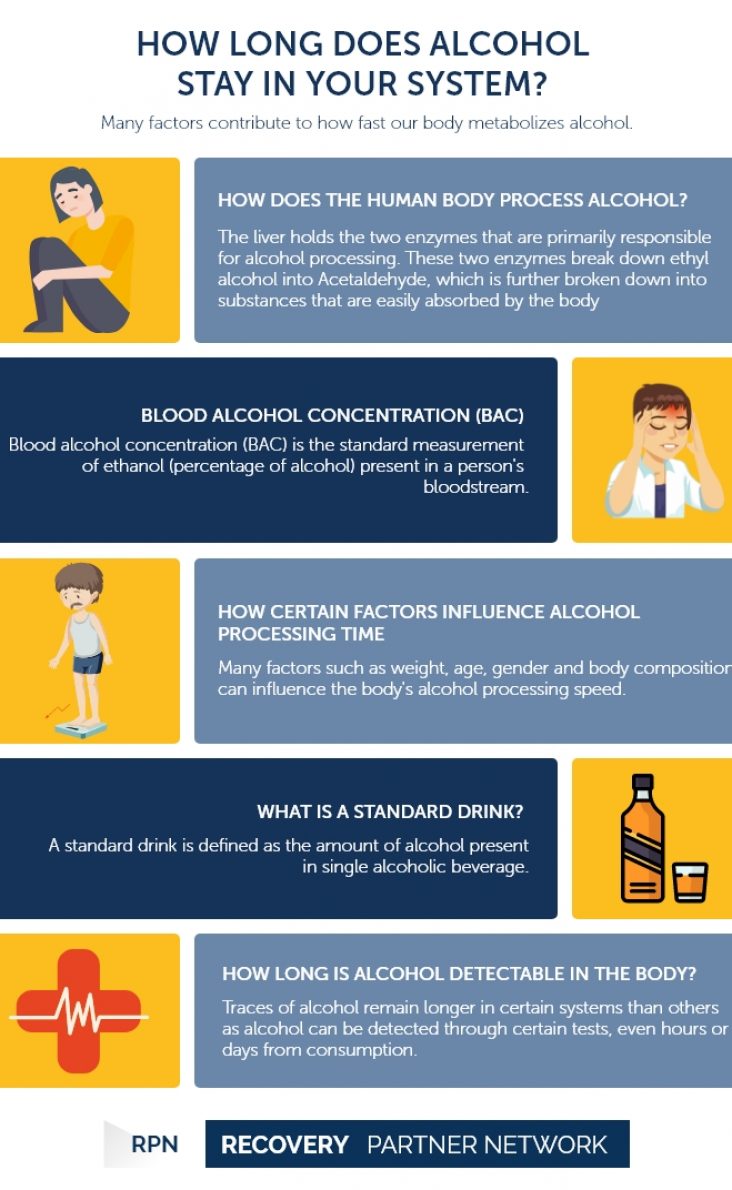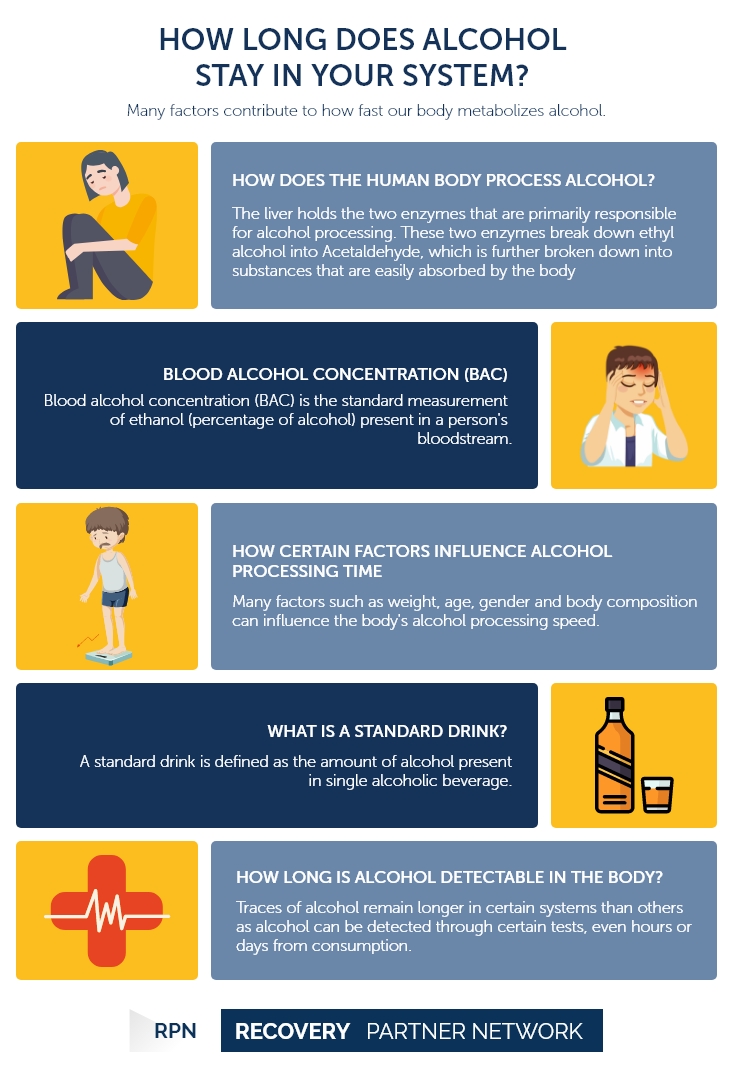Many factors contribute to how fast our body metabolizes alcohol.
How Long Does Alcohol Stay in Your System?
How Long Does Alcohol Stay in Your System? | Table of Contents
How Does the Human Body Process Alcohol?
Factors such as the amount of alcohol consumed and the speed at which the body processes alcohol greatly determine how long alcohol remains in your body. The metabolism process of alcohol is much faster in comparison to other substances, as it contains a very short life span in the body. On average, it takes our body around one hour to process one standard drink.
Once consumed, alcohol travels to the stomach, where the metabolism phase begins. Around 20 percent of alcohol is absorbed through the stomach. The rest travels through the small intestine, where it would then be absorbed into the bloodstream.
Once the alcohol reaches the bloodstream, it is rapidly transported throughout the body. Most of this alcohol ends up in the liver, where the majority of alcohol metabolism takes place. Since the liver undertakes most of the heavy work in alcohol processing, it is one of the organs that are most at risk from long-term alcohol use.
The liver holds the two enzymes that are primarily responsible for alcohol processing. These two enzymes break down ethyl alcohol (drinking alcohol) into Acetaldehyde, which is further broken down into substances that are easily absorbed by the body. Alcohol dehydrogenase, an enzyme that is also found in the stomach, breaks down high levels of alcohol in our liver and stomach and converts them into energy. While one enzyme converts alcohol into energy, Cytochrome P450 2E1 is an enzyme that absorbs the body of its energy to break down alcohol. This enzyme is highly active in the liver of chronic drinkers.
Catalase, a third enzyme that is found in cells throughout the body, also metabolizes a small portion of alcohol. The Acetaldehyde that is delivered to the brain through catalase metabolism can fuse with the neurotransmitters to form tetrahydroisoquinolines, which are believed by some scientists to be the cause of alcoholism (although this is quite controversial.) These scientists believe that the existence of tetrahydroisoquinolines can be used to determine if an individual is a social drinker or an addict.
Many factors influence the processing time of alcohol, including:
- Gender
- Bodyweight
- Diet
- prescription medications or recreational drug use
- medical history
- Pace of drinking
This implies that the alcohol processing pace can vary from one person to another. Nevertheless, alcohol processing time is exceptionally consistent for most people. Most individuals process one standard drink (one glass of wine or beer or one-shot) within one hour. If an individual has five standard drinks, it will require 5 hours for their body to process alcohol.
The body is remarkably effective in processing alcohol unless the alcohol is consumed too quickly that it leads to alcohol poisoning. Around 90 to 98 percent of alcohol that enters the body is rapidly metabolized and absorbed, whereas the remaining alcohol is excreted through urine, sweat, feces, and vomit.
FAQ
Food may help your body absorb alcohol, and water can help reduce your BAC level. However, it will still take one hour to metabolize 20 mg/dL of alcohol.
While the duration in which a person remains drunk varies, the average, moderately-intoxicated person will probably sober up in about 6-8 hours. Although there are many ways to appear sober and alert, it does not in any way speed up the alcohol process.
Blood Alcohol Concentration (BAC)
Blood alcohol concentration (BAC) is the standard measurement of ethanol present in a person’s bloodstream. In other terms, BAC, also known as blood alcohol content, refers to the percentage of alcohol in the blood. For example, for most people, one ounce of alcohol will produce 0.015 percent of BAC. This level signifies little to no alcohol in the bloodstream after 10 hours.
The negative effects of alcohol appear once the BAC level spike from 0.05 to 0.055 percent. However, the lethal amount of blood alcohol is considered to be 0.45 percent. Most individuals start to lose their balance and motor skills from 0.08 to 0.09 percent BAC level. With a BAC of 0.15 percent, most individuals begin to vomit due to the excessive levels of alcohol in the blood and the body’s inability to metabolize the alcohol fast enough. Once the BAC reaches 0.35 percent, most individuals lose consciousness. However, if the alcohol is consumed rapidly, through binge drinking, an individual might reach lethal levels of BAC before they pass out. This lethal level of alcohol can result in alcohol poisoning.
How Certain Factors Influence Alcohol Processing Time
Many factors can influence the body’s alcohol processing speed. Some of the most important factors are:
- Weight
- Gender
- Age
- Body composition
- Health
- Genetics
- Time since the last meal
- The drink mixed with alcohol
- Medications and other drugs
Body weight has only a slight impact on the body’s alcohol processing time. However, it can greatly influence intoxication levels and BAC.
Some experts believe that men metabolize alcohol faster than women, whereas another group of experts states that men generally have lower BAC than women, mainly due to the differences in weight and fat composition.
Generally, younger individuals process alcohol faster than older individuals.
Low-water fatty tissue cannot absorb alcohol as much as high-water muscle tissue, implying that individuals with more body fat tend to generally have higher BAC.
Healthy individuals process alcohol faster, especially those whose livers are in excellent condition. Therefore, individuals with liver damages find it difficult to process alcohol.
The genetics of certain individuals may enable them to either process alcohol faster or slower. A great example of this can be found in East Asian populations, who process alcohol quite differently than others.
The body takes quite a while to absorb and metabolize alcohol on a full stomach. This usually results in a lower BAC.
Certain mixers, such as caffeinated sports drinks and soft drinks, cause alcohol to be absorbed rapidly by the body, whereas others, such as water or fruit juice, cause alcohol to be processed slower by the body.
Certain medications can affect how the body metabolizes alcohol. Thus, it is crucial to check with your doctor before drinking while on medications. Additionally, alcohol should never be mixed with illegal drugs, especially those with similar effects as alcohol.
FAQ
It may take an hour to metabolize a drink, but it takes approximately thirty minutes before you feel alcohol’s effects.
What is a Standard Drink?
Each and every alcoholic beverage has different concentrations of alcohol. A standard drink is described as the amount of alcohol present in one normal-strength (5% percent/10 proof) of a 12-ounce beer. The alcoholic concentration in various alcoholic beverages are provided below:
| Drink | Alcohol Content (%) | Number of Standard Drinks |
| 12-ounce beer | 5% alcohol | 1 standard drink |
| 12-ounce malt liquor | 8% alcohol | 1.5 standard drinks |
| 40-ounce malt liquor | 8% alcohol | 4.5 standard drinks |
| 1.5 ounce (standard) shot of 80 proof liquor (certain whiskey, vodka, gin, tequila, brandy, cognac, etc) | 40% alcohol | 1 standard drink |
| 1.5 ounce (standard) shot of 151 proof alcohol (certain rum) | 75% alcohol | 2 standard drinks |
| 1.5 ounce (standard) shot of 190 proof (grain alcohol, moonshine or Everclear) | 95% alcohol | 2.5 standard drinks |
| Mixed drinks | Depends on the mix | Depends on the mix |
| 5-ounce (standard) glass of wine | 12% alcohol | 1 standard drink |
| 3-4 ounce (standard) glass of fortified wine | 17% alcohol | 1 standard drink |
How Long is Alcohol Detectable in the Body?
As alcohol is transported throughout the body via the bloodstream, various tests are currently available to detect its presence. Traces of alcohol remain longer in certain systems compared to others. Hence, these tests are able to detect alcohol, even hours or days from consumption.
| Test Type | Time Span in Which Alcohol is Detected |
| Urine test | 12 – 48 hours |
| Breath test | 24 hours |
| Hair test | 90 days |
FAQ
Alcohol is eliminated from the bloodstream at about 0.015 per hour. Alcohol can show up in a blood test for up to 12 hours. Alcohol can be detected in urine for up 3 to 5 days via the ethyl glucuronide (EtG) test or 10 to 12 hours via the traditional method.
Recovery Partner Network
We aim to educate and empower. If you feel our library of resources does not cover your specific need, reach out to us, and we would be happy to help.
STATISTICS
© Copyright 2025


